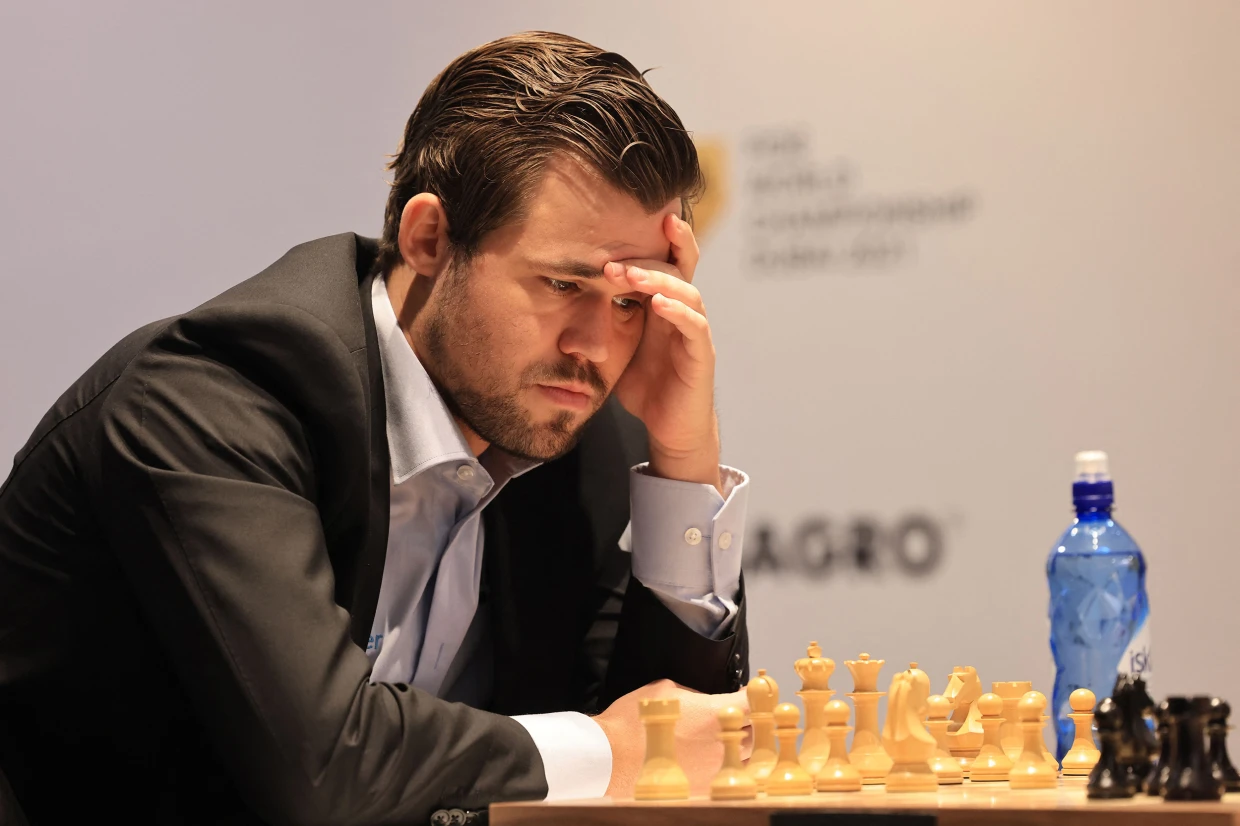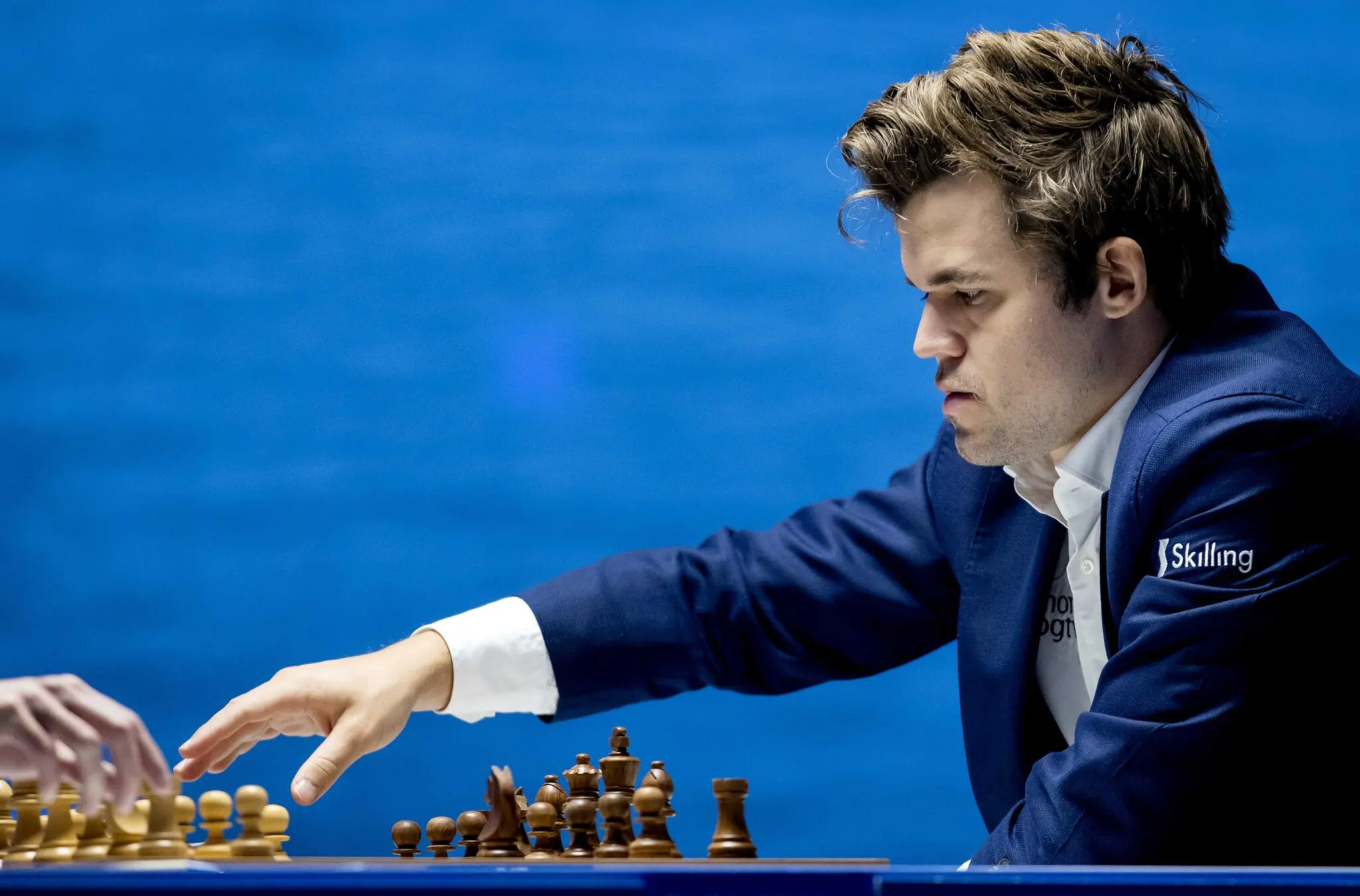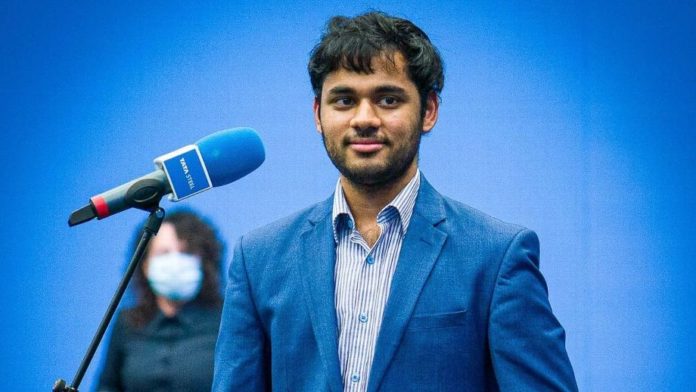The tiny North Sea-side town of Wijk Aan Zee had two storms slamming its coast. Corrie, bellowing at 100kmph knocked down trees and disrupted flights at the Schiphol airport on Monday, and the other one, that goes by an Indian name, blew away the field the night before.
Eighteen-year-old Arjun Erigaisi is getting used to the analogies. He’s fresh off a breakout spell of months — most recently, winning two Tata Steel events (Rapid and Challenger) in two continents. One of them, a brilliant 10.5/13 finish at Wijk Aan Zee last weekend with a round to spare, had him move up 49 spots in the live classical ratings and break into the top-100 with a 2659.5 Elo. He’s now the fourth-highest ranked Indian – after Viswanathan Anand, Vidit Gujrathi and Harikrishna Pentala. He’s also placed No 4 in the world in juniors and earned high praise and a ‘soon-to-be 2700 Elo’ punt from reigning world champion Magnus Carlsen.
Arjun is back home in Warangal now trying to make sense of all that he’s done. He’s soft spoken, a decibel that can be drowned in an air conditioner’s hum. It cracks when he recounts his favorite fan moment from last week. “I asked Magnus if we could take a picture together and he replied ‘of course’ and congratulated me on my win,” Arjun says in disbelief. “It felt pretty special.”
For all his giddy success, Arjun’s still without a sponsor.
A couple of years older to fellow Indian Gen Z prodigies, Arjun wasn’t hustling a youngest-ever Grandmaster (GM) title in his tweens and was relatively unknown. GM Srinath Narayanan who trains both Nihal Sarin and Arjun had to contend with the polarity. “Earlier, Nihal would often have surplus tournament invites, and I’d try to negotiate with organisers so Arjun could play some of them instead. I’d tell them he’s an equally strong player and only a year older but rarely found a positive response. He was just not out there at the top of the Google search feeds,” Srinath says.
A keyword that’s upturned his fortunes in recent months, Arjun believes, is opportunity — in the form of sufficient tournaments. In May last year he emerged as the surprise winner of the Indian tour to qualify for the elite Champions Chess Tour, run by Carlsen. At the Goldmoney Asian Rapid next, he ended former world No 2 Levon Aronian’s 16-game unbeaten streak and turned the spotlight on himself. It was also a sure sign that he’d purged a major challenge he’d been grappling with: being intimidated by higher rated players. At the base, that fear stemmed from awareness of glaring weaknesses in his own game. His opening repertoire lacked teeth, an aspect he’s toiled on with his trainers over the past three years. He could still do with some more ideas for Black, he believes. Arjun’s current strengths — superlative calculation and a distinctly well-rounded game that pivots on flexibility pins it all together. “Earlier, I was just a very strong positional player. Now I think my style is more universal, more adaptable.”
In November, at the Lindores Abbey blitz organized in legendary player Mikhail Tal’s memory in Riga, Lativia, Arjun won 13 games out of 18, gained over 107 rating points at 2723 Elo, whizzed into the blitz top 30 crushing Aronian and current world No 4 Fabiano Caruana, and finished in third position.
“At the moment, Arjun is the strongest among our young bunch of guys,” says former world champion Anand, who mentors the young crop of Indian GMs including Arjun under the umbrella of his WestBridge-Anand Chess Academy. “The ability to spot a line till its final move, get there first and more importantly, be sure that what you’ve spotted is correct, is crucial. In chess, a confident calculator is better than a good calculator. Arjun is not only strong in calculation, he doesn’t doubt himself either.”
Arjun also trains with Uzbek GM and Anand’s former longtime second, Rustam Kasimdzhanov. “After training top guys for more than a decade, coaching a young player, who’s really keen to learn, felt good. I felt like I might actually be helpful,” Rustam, who was Caruana’s coach for six years, says. “Arjun and I started working together in September last year and he impressed me with his endless readiness to change and evolve. We work on openings, calculation, endings and analyse his games. I try to give him as much insights as possible from my own experience so he doesn’t hopefully repeat my mistakes.”
Arjun is grateful for the learnings so far. “I didn’t realise,” he says, “that I lacked the aggression to finish off games from winning positions before Rustam pointed it out to me. Working on it has helped me hugely.”
Soon after Lindores Abbey, Arjun earned an invitation to the Tata Steel rapid event in Kolkata. He turned out to be a head-turner. He won the Rapid title, a full point ahead of a much stronger field which included Aronian and Sam Shankland, among others, and went on to find a last-minute spot in the Blitz event after B Adhiban pulled out. He tied for the top prize with Aronian before losing in the Armageddon tie-break. A few weeks later at the World Blitz in Warsaw, Arjun played out impressive draws against a battery of top names – Carlsen, Aronian, Daniil Dubov, and Ian Nepomniachtchi. After 16 rounds he was placed at 11.5 points, just 1.5 points behind leader Aronian. Three losses thereafter – against Maxime Vachier-Lagrave, Alireza Firouzja and Martyn Kravtsiv had him take a slide in the standings.
He arrived in Wijk Aan Zee last week as the highest rated player in the Challengers section. The unsurprising title at the end of the week earned him a spot in the 2023 Masters section of the tournament, which Carlsen won this year. It’s the only tournament Arjun has a certain invitation to right now.
“It clicked for him nicely and he is a sort of complete package of a player,” Anand says. “It’s healthy to have this bunch — Praggnanandhaa, Nihal Sarin, Gukesh, Raunak Sadhwani, Leon Mendonca, driving each other. They have their good streaks but we are still a long way from declaring victory. Arjun is clearly the breakthrough player at the moment. Hopefully, the buzz will fetch him more tournament invites and perhaps a sponsor who’d cover his training and tournament expenses.”
A numbers wiz, Arjun’s goals are usually numeric. Like the time he wanted to play on a lower board at the U-16 Olympiad in 2018 to gather more points but ended up doing just the same on a top board. Or when he set himself a 10.5 finish target for Wijk Aan Zee and didn’t miss the mark.
If the pandemic opened up streaming opportunities, online coaching roles and a whole hog of side-gigs for the senior players, the juniors had no such commitments. Little academic pressure and plenty of time to pull all-nighters of blitz, four-person chess, Among Us, and hunker down to work on in their game. “With the senior lot, the slides in form post pandemic have been sort of apparent, because they’d been engaged in so many different things over the last two years and it wasn’t easy to do a cold turkey once tournaments resumed,” Srinath says. “Also they needed a steady calendar of regular tournaments much more than the younger lot to stay in competitive shape. The emerging bunch, including Arjun, had to deal with none of it and could respond better once over the board events were back.”
“Once the obsession for chess set in, I lost all my other interests. I used to do math for fun and watch tennis earlier.”
At the moment, Arjun has no tournaments on the horizon. He’s usually given to a frenzy of good results, followed by a calm. After waddling in the 2300s for two years, fighting self-doubt and confidence crisis, Arjun stepped into 2018 with zero IM or GM norms. By August he’d ticked both boxes, winning six norms and gaining 200 Elo rating points that year. Today, he’s rated above 2650.
For the short term, Arjun’s focus, Srinath believes, should be to just win a lot of games. “That’s the only way he can touch 2700. Once he moves to 2750 he might need to become a bit more solid in his play and be able to get acceptable positions, especially with Black. Until then, he needs to keep up what he’s doing now, get more opportunities to play opposition around 2600 and be able to beat them.”
Outside chess, Arjun struggles to name his interests. The reason has a lot to do with chess too. “Once the obsession for chess set in, I lost all my other interests,” he offers, forthright. “I used to do math for fun and watch tennis earlier.” He hasn’t found time for either in a while and learnt of Rafael Nadal’s epic fightback from two sets and three breakpoints down for a record 21st Slam last weekend only through news reports.
During tournaments he finds enough willing peers for fantasy board game Avalon sessions, and picks practicing meditation as a habit he wants to learn to soothe nerves after scares and defeats. “Sometimes I can get shaky and blunder in the round after a loss. It happened to me last year in Spain,” he says, “I don’t have a fixed pre-game routine at this point. Meditation might just fit right in.”
Now, after the storm he’s kicked up, Arjun is slipping into some quiet — Puzzle Rush, crunching numbers for a crack at a 2700-Elo goal, waiting around for tournament invites and hoping he’s done enough to have caught a sponsor’s eye.










